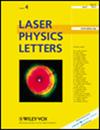Generating a maximally entangled state via a pure global noise environment
IF 1.4
4区 物理与天体物理
Q3 OPTICS
引用次数: 0
Abstract
We studied the entangling power of two pure global noises, i.e. amplitude damping noise and classic noise. The entangling power of the two-qubit amplitude damping global noise periodically oscillates with time. Additionally, the entangling power of two-qubit global classical noise increases exponentially with time. The maximum entangling power of both of them exceeds that of the perfect entanglers. Based on this, we propose the conditions for generating a maximally entangled state with global noise acting on a two-qubit separable state. Only if the two-qubit composite system, which is initially in one of those product states:通过纯全局噪声环境生成最大纠缠态
我们研究了两种纯全局噪声(即振幅阻尼噪声和经典噪声)的纠缠功率。双量子比特振幅阻尼全局噪声的纠缠功率随时间呈周期性振荡。此外,双量子比特全局经典噪声的纠缠功率随时间呈指数增长。它们的最大纠缠功率都超过了完美纠缠器的纠缠功率。在此基础上,我们提出了作用于双量子比特可分离状态的全局噪声产生最大纠缠态的条件。只有当双量子比特复合系统最初处于其中一个乘积态时,才能产生最大纠缠态:12(|0⟩±|1⟩)⊗12(|0↪Pe_27E9±|1⟩)、|10⟩和|01⟩遭受振幅阻尼全局噪声时,我们才能通过适当控制振幅阻尼的演化时间,使该系统处于最大纠缠态。最后,我们利用这两种全局噪声研究了最大纠缠贝尔态的解纠缠问题。这两种全局噪声不能完全解除贝尔态Φ±的纠缠。在振幅阻尼全局噪声的影响下,贝尔态 Ψ+ 的纠缠发生周期性变化,在消失和恢复之间交替进行,并在一个周期内达到最大纠缠。贝尔态 Ψ+ 或 Ψ- 的纠缠完全不受全局经典噪声的影响。贝尔态 Ψ- 的纠缠对振幅阻尼全局噪声也是稳健的。
本文章由计算机程序翻译,如有差异,请以英文原文为准。
求助全文
约1分钟内获得全文
求助全文
来源期刊

Laser Physics Letters
物理-仪器仪表
CiteScore
3.30
自引率
11.80%
发文量
174
审稿时长
2.4 months
期刊介绍:
Laser Physics Letters encompasses all aspects of laser physics sciences including, inter alia, spectroscopy, quantum electronics, quantum optics, quantum electrodynamics, nonlinear optics, atom optics, quantum computation, quantum information processing and storage, fiber optics and their applications in chemistry, biology, engineering and medicine.
The full list of subject areas covered is as follows:
-physics of lasers-
fibre optics and fibre lasers-
quantum optics and quantum information science-
ultrafast optics and strong-field physics-
nonlinear optics-
physics of cold trapped atoms-
laser methods in chemistry, biology, medicine and ecology-
laser spectroscopy-
novel laser materials and lasers-
optics of nanomaterials-
interaction of laser radiation with matter-
laser interaction with solids-
photonics
 求助内容:
求助内容: 应助结果提醒方式:
应助结果提醒方式:


